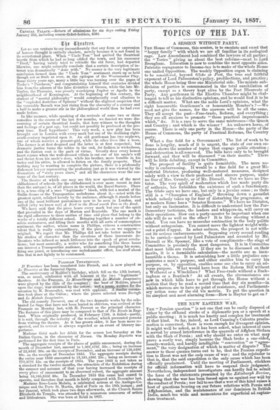TOPICS OF THE DAY.
A SESSION WITHOUT PARTY.
THE House of Commons this session, is to emulate and excel that "happy family" with Commons, we are all familiar in its zoological cage. Law Amendment bad combined the lawyers of all parties ; the " Tories " giving us about the beat reforms—next to Lord Brougham. Education is now to combine the most opposite sides. Patriotic repugnance to Income-tax is to make of the whole House one united Opposition. The weekly Opposition organ is claiming to be considered, beyond Globe or Post, the true and faithful exponent of Lord Palmerston's policy, predilections, and practice; the whole House being thus one Ministerial side. The minute subdivision of parties is consummated in the total annihilation of party, except as a theory kept alive by the Poet Illaureate of Party. Any gentleman in the Elective Chamber might be challenged to tell us his distinctive opinions, and he would find it to be a difficult matter. What are the noble Lord's opinions, what the right honourable Gentleman's or honourable Member's ?—We need not give the names for the answers 'will be all the same. They all accept the past—Free-trade, Reform, and everything ; they are all anxious to promote "those practical improvements which," &e. It is a race to serve the same mistresses—the Queen and Country ; and which is the winner ? An unknown horse, of course. There is only one party in the House—the party of the House of Commons, the party of Practical Reforms, the Country
Pa at a fine field for a Government! The list of work to be done is lengthy, much of it is urgent, the state of our own columns shows the number of topics that engage public attention ; and obstruction is all removed. The bills have only to be brought forward, and they will be discussed "on their merits." There will be little debating, except in Committee.
The prospect of facility is quite formidable. The mere novelty is embarrassing. It would be a fine field for a great Ministerial Dictator, producing well-matured measures, designed solely with a view to their professed and sincere purpose, under no fear of Mrs. Grundy, or of Mr. Disraeli. But we have no Dictator. The very spirit of moderation which has made party die of asthenia, has forbidden the existence of such a functionary. The Globe says we have one, but only in a jocular sense ; as there still is a "Champion of England, throwing down a gauntlet which nobody takes up for fear of disturbing the programme or as modern Rome has a Senator Romano." We have no Dictator, but only an Insinuator. It is difficult to understand how the Parliamentary tacticians, the leaders and whippers-in, will carry on their operations. How can a party-muster be important when one side will do as well as the other? It is like steering without a wind. You can have no muscular contraction in the body politic without antagonism. You cannot move the lightest weight without a point d'appui. In sober sadness, the prospect is not without its serious embarrassments. Supposing every second reading to be carried—moved by Lord Palmerston and seconded by Mr. Disraeli or Mr. Spooner, like a vote of compliments—the stage of Committee is precisely the most dangerous. It is in Committee that most bills are runed. If they are to be discussed on their merits, it is a formidable calculation—the merits are so inexhaustible a theme. It is astonishing how a little prejudice concentrates a man's purpose, and either enables him to carry his purpose, or, by opposition, enables some one else to carry an adverse purpose. What would have been the Reform Bill without a Wetherel or a Winchilsea ? What Free-trade without a Buckingham or a Bentinck ? At all events, the circumstances are new in which bills have to get through the House without a motion that they be read a second time that day six months—in which movers are to have no point of resistance, and Parliamentary action none of the old vis motrix. To put the question in. its simplest and most alarming form—How is Hayter to get on ?


































 Previous page
Previous page